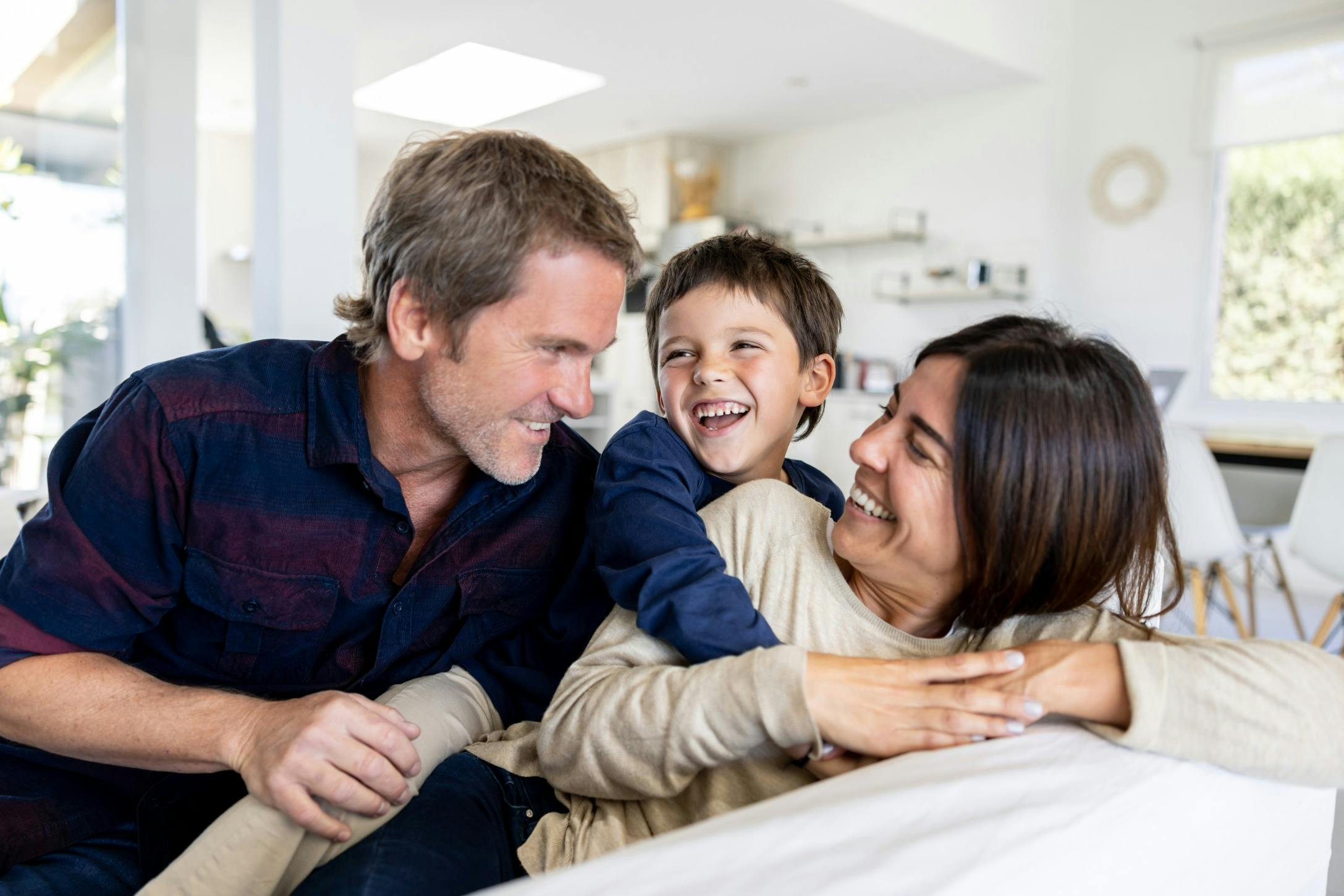Help Him Live a Longer, Healthier, Happier Life
As big and tough as men can be, their macho-mentality can also present some serious health concerns. Discover common issues and helpful ways to encourage men to take better care of their physical and mental well-being.
•
Updated11/19/2024
•

Despite societal progress, gender stereotypes are deeply engrained in all of us — especially men. In Hanna Rosin’s 2016 NPR article, ‘Is It OK For Boys To Cry?’ she acutely sums up the current trend for male vulnerability, “boys can cry, if they do it in just the right way.”
The result is men tend not to ask for help with their emotional and mental health issues. What about the age-old complaint that men would rather drive around in circles than ask for directions? According to a 2015 analysis of OnStar data, this stereotype is equally spot on.
The call to ‘man up’ runs so deep men are substantially less likely to ask for help when they are experiencing a mental or physical issue. In fact, a US national survey conducted in May 2022 revealed that “one-third of men do not think they need annual health screenings.
The result?
Men Put Themselves at Greater Health Risk By Not Seeking Help
Among the many lessons, we’ve been forced to confront thanks to the global pandemic is the danger of delaying or avoiding medical care. As Elaine K. Howley reports in her article, ‘The U.S. Physician Shortage Is Only Going to Get Worse. Here Are Potential Solutions,’ published in TIME on July 25, 2022:
Health care delayed is often health care denied, and a growing number of Americans are going to experience this unfortunate fact.
When a patient fails to seek help, they put themselves at higher risk of suffering from delayed or undiagnosed health concerns. Among men, specifically, these include, but are not limited to:
Higher Risk of Heart Disease
According to Johns Hopkins Medicine, men develop heart disease 10 years earlier, on average, than women.
Suffering from Low-Testosterone
The UW School of Medicine and Public Health reported that nearly 40% of men 45 and older suffer from low testosterone. This incredibly common occurrence can impact a wide variety of health issues ranging from increasing a man’s risk of heart disease and Type II Diabetes to decreasing sexual performance and enjoyment.
Sexual Dysfunction
Sexual dysfunction among men is a health concern that should not be ignored, according to Yale Medicine — and not just because it can take away from enjoying sexual activities. ED can be a sign of serious underlying health concerns, including:
- High blood pressure
- Cardiovascular disease
- High cholesterol
- Obesity
- Type II Diabetes

It can take just the slightest health issue to throw someone out of wack and decrease their quality of life. By diagnosing and addressing this health concern, they can rediscover a new joy and zest for living.
4 Health Concerns to Address
Spouses, partners, and loved ones are on the front lines. This presents some advantages and disadvantages when it comes to seeing and identifying health concerns — whether they are glaring or subtle.
Sometimes a partner is so close they have trouble perceiving issues. But more often than not, their daily observances allow them to be exceptional detectives with caring hearts.
The following health concerns outline four of the most common issues which plague men, especially in middle age and later stages of life. These can be used as a good gut check for issues a partner may want their male significant other to consider addressing.

Early cancer diagnosis substantially increase survival rates and overall quality of life.
1. Cancer
Simply put — men are more likely to die from cancer than women. It’s a fact that’s supported by countless studies and government entities, including the CDC, which found that in the United States, men are 39% more likely to die from cancer.
Two of the primary reasons attributed to early mortality due to cancer among men are:
- Lifestyle
- Reluctance to Seek Help
While major changes to a male’s lifestyle in the later stages of life may not significantly help their chances of survival, seeking help will. A 2015 study published in the National Library of Medicine found that “Further reductions in mortality may be most effectively achieved by diagnosing all cancers before they progress to stage 4.”
Additionally, we know that 76% of cancer-related deaths in the US among patients 50-79 were caused by cancers not commonly screened for. So even men (and women) who attend their yearly physicals may suffer from a late-stage diagnosis.
HOW TO HELP: Revolutionary Galleri® Blood Test
The revolutionary Galleri® Blood Test (aka GRAIL cancer test) can help patients identify more than 50 different types of cancers — many of which are not commonly screened for.
And the test requires minimal effort on the part of the patient. It is completed with a simple blood draw that can easily be performed during any routine healthcare visit.

Despite what society has engrained in many of us, asking for help can be a sign of strength, as it gives us the ability to lean on other's skills to maximize our own.
2. Hormone Imbalances
Hormone imbalances, especially Low Testosterone (aka Low T), can contribute to a wide variety of undesirable symptoms. These include, but are not limited to:
- Weight gain
- Fatigue
- Insomnia
- Decreased sexual performance
- Erectile dysfunction
- Inability to maintain muscle mass
- Depression
- Anxiety
- Heart disease
- Osteoporosis
- Short- and long-term memory loss
- Irritability
- Decreased motivation
- Prostate cancer
Though this health concern is rarely discussed, research conducted by the New England Research Institutes in Watertown, Mass. suggests that it’s extremely common. The research team found that 1 in every 4 men over 30 has Low Testosterone.
HOW TO HELP: Bioidentical Hormone Therapy
Traditionally, hormone therapy is provided through synthetic hormones. These are typically a one-size-fits-all prescription utilizing a hormone engineered in a lab. These hormones do not match the structure of the patient’s hormones and can be difficult (if not impossible) for the body to process and utilize.
Bioidentical hormones are created with the exact chemical structure as the hormones produced by a patient’s body. This can reduce (and often eliminate) and side effects experienced due to the use of synthetic hormones.

Don't settle for nagging injuries and lingering pain. Help stimulate the body's natural ability to heal.
3. Injury Recovery
Walk it out. Rub it out. Power through. Men are taught to ignore injuries from a very young age. They are praised for being tough and strong in the face of physical pain.
There are some upsides to this mantra. In the heat of battle, those better able to grin and bear it are more likely to persevere. But in daily practical terms, ignoring injuries and fighting through the pain often results in exponentially more damage.
By seeking help with injury recovery can allow men (and women) to heal — reducing pain and the chance of recurrence.
HOW TO HELP: Prolotherapy - Natural Pain Relief
Prolotherapy is a non-invasive approach to helping naturally stimulate the body’s ability to heal itself. It’s not a fix-all for everything. It won’t heal broken bones or re-attach ligaments.
But it has been shown to help:
- Heal strained ligaments
- Improve joint mobility
- Reduce overall pain
- Increase muscle performance

Social connection isn't just about having fun. Science shows that if you want to live longer, it's important to have friendships you can count on.
4. Need for Meaningful Relationships
According to Survey Center on American Life, men are in a “Friendship Recession.” This occurrence isn’t just because of the pandemic. It is a phenomenon that’s been slowly increasing over time. The national review found that:
The percentage of men with at least six close friends fell by half since 1990, from 55 percent to 27 percent.
The concern with men having fewer friends isn’t just about quality “bro time.” It’s a major health concern. Research studies, like the one published in the journal Personal Relationships, have found a direct correlation between supportive friendships and the physical and mental well-being of a patient.
In fact, a clinical review of nearly 150 different research studies found that those with strong social ties were 50 percent more likely to survive.
HOW TO HELP: Making Friends
Making friends can feel easier said than done — especially when you consider how the plethora of how-to articles. At the core of these tips is one solid theme: get involved in an organized group. This offers an organic way to start connecting with others through shared mutual experiences and passions.
Popular Health Tips
3 Practical Ways to Help Men Help Themselves
Because the ‘Man Box’ society “devalues any form of emotional expression traditionally deemed to be feminine,” seeking help can be difficult for males. In fact, the idea doesn’t even occur to most men. Even for those who do consider asking for help, there is often inherent resistance.
For partners, this can present some serious challenges. How do you help someone who doesn’t want help? The following are a few practical tips to help men help themselves (even if they don’t think they want to).
1. Ask Them for Help (and/or Support)
Few things empower a vulnerable person more than helping someone. For males struggling to have health concerns — like hormone imbalances — be addressed, sometimes helping their partner address a hormone imbalance can be enough to get past their personal hurdle.
By asking for help attending an appointment, you can encourage your partner to visit the doctor and make an appointment themselves.

One of the best ways to get dad onboard with attending and event or appointment he might otherwise avoid is by making it al about the family.
2. Make it a Family Affair
Cancer screening, even something as non-invasive and easy as the Galleri® Blood Test, can feel like a lot to do solo. By making a family affair for both partners (and maybe even elderly grandparents), the process can become less intimidating.
With everyone participating, it’s suddenly just part of the day. Make it even more special by planning an outing after the blood draw.
3. Provide Space and Support to Make Friends
One of the most common ways women try and help their male partners make friends is by playing “matchmaker” — making social plans with women whose mate they believe their male counterparts will like. There’s nothing inherently wrong with this approach. Men have a tendency to be nice in said social situation and then move on.
Successful matchmaking among men typically requires getting the men alone, doing an activity they both enjoy. For those who want to help their male partners make friends, consider setting up a gathering that naturally separates the males and females so they can spend time bonding.
But even more important than successful matchmaking is providing space and support for males to make and maintain friendships. Activities, like a weekly pick-up basketball game or watching Sunday night football with the boys are about a lot more than having fun without their partner. Those moments are essential for building stronger relationships.
Support & Guidance from Your Family’s Naturopathic Doctor
Premier Integrative offers treatment and support for the whole family. We partner directly with each family member individually to help them achieve their health goals. For many families, this all-inclusive treatment plan has made medical support more approachable.






